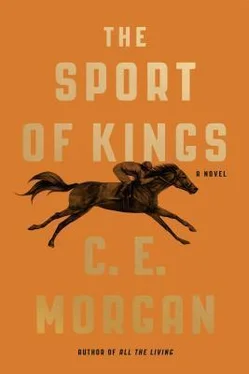“Excuse me, what did you say?”
“You used the plural instead of the singular. I’ll be speaking to your parents, Mrs. Garrett.” She was spun forthwith to the principal’s office, where her singular was called on the telephone, and then spun again out to the broad concrete steps of the school, where she rested dazed and relieved, like a prisoner suddenly released from years of hard, useless detail. She preferred to sit out here alone. Almost as soon as her mother had left, she’d decided that she would no longer tolerate humans, especially the barely bipedal variety by which she was surrounded: their relentless chatter, the strong smell of their bodies, their dumb games. She classified them far, far down in the family of tailless primates. School had long been a matter of sitting blandly for the duration, eyes locked on the proceedings with your mind flatlined, maybe rereading your textbooks for typos and collation errors. She’d begun to spend her time in the bathroom, picking at her nails or counting the holes in the pegboard ceiling there. She’d gone so frequently and stayed so long that Mrs. Garrett had finally called the farm with a concern that she needed to be examined. She was sent to a urologist at the University of Kentucky who, after numerous tests and return visits, was the first to simply ask why she went to the bathroom so often, to which she replied, “To be by myself.”
“Right, but you’re peeing a lot,” he said.
“No.”
“You’re not urinating?”
“No.”
“You’re going to the bathroom to be alone, but not to urinate?”
“Yes.”
“Jesus!” he’d snapped, and dropped his clipboard down on the examining table beside her, then rubbed his eyes for a long while without bothering to take his glasses off. “This is why I’m not a pediatrician,” he said through his hands. “I don’t speak childese.”
“Me neither,” she said. He took his hands away from his eyes and looked at her in consternation, and then, fifteen minutes later, her father was driving her home along Richmond Road, saying, “I don’t understand what just happened here,” and Henrietta said, “I don’t want to talk anymore.”
Now she sat very still on the school steps, motionless as a dial casting time’s shadow. She was waiting for her remaining parent, her immediate genetic antecedent, the Forge who had forged her, but it was old Barlow who showed up in one of the rattling farm trucks — a white 250 with a toolbox in the bed, shedding farm chaff in a swarm as it braked before her. Barlow reached over and popped open the passenger door, his wizened face etched with concern.
“You sick, honeypie? Your daddy sent me up to fetch you.”
Henrietta just shook her head and crawled up beside him as he lit a cigarette and pulled out of the school’s drive. They were silent as they passed the glassed storefronts of Paris, the antebellum homes with American flags snapping smartly from porch roofs. Through the glass of the windshield, through the bitter brown lacework of the trees, the sun meted out an autumnal afternoon, weakening even as they watched.
She turned to Barlow. “Who built the stone fences?”
“Boy, um … the Irish, maybe? I think I heard that before.”
“Are you Irish?” she said.
“I don’t really know, darlin’, I’m just a country mutt.”
As they passed the courthouse, on the other side of the road, the familiar sight of three old black men on rickety metal chairs. They sat there every day shaded by their Kangol caps, cigars and folded newspapers in hand, paling of white hair on their cheeks. One glanced at her briefly as she passed, but in another instant, the dark round of his face was gone.
She turned a speculative and careful eye on Barlow. “Did you know n-i-g-g-e-r is a bad word?” she asked.
“You ever hear me say it?” said Barlow.
“No.”
“There you go. Guess I knew it then.”
“Yeah, but who decided that?” she pressed.
“God did…,” he said, flipping his cigarette butt out his open window. “God hath made of one blood all peoples of the earth.”
“There are four different kinds of blood,” she said. “It’s a medical fact.”
“Well, I don’t know anything about that.”
She expected no further response, and she didn’t get one. Barlow just nodded with a considering face and drove easily beside her. He was a man who had stayed married forty years and raised four bullheaded boys by holding tight the gunnels and steadying the boat. He was content with his holdings and not inclined to fight.
They drove for a time behind a truck loaded with tawny, bundled tobacco, the cured and withered leaves making small, abrupt motions in the breeze like yellow hands waving. The flatbed turned into the low redbrick tobacco warehouse on East Main, where Henrietta could see, stacked and heaped in golden sheaves, the harvest prepared for auction. The dead plants were even more beautiful than plants in the field — crisp, sculptural, turned by curing to the brown of baked bread. For the first time in weeks, something stirred in her as she gazed at what had to be tobacco’s heaven.
“Why don’t we grow any tobacco?” she asked.
“Kinda slow out of the starting gate,” was Barlow’s dry reply as he rooted around in his breast pocket for another cigarette. As always, he got the small smile he was aiming for. But then Henrietta shifted wearily and Barlow turned to her and said, “You wanna tell old Barlow what happened at school today?” but she just shook her head, staring out the window.
As they pulled into their own drive, she said, “I hate school.” She stomped once on her book bag, where it lay in a heap on the floorboard of the truck, and she crossed her arms. Acid tears smarted her eyes.
Barlow cocked his head and said, “I liked it so much I stayed all the way to the eighth grade. Come on.” He eased out of the truck, careful on his feet, which were arthritic, a far cry from the day he first went to work on a farm as a spry ten-year-old boy Friday. But Henrietta remained where she was, watching him with a sullen expression. Barlow circled around to her side of the truck, unlatched her door, and drew it wide.
“Come on, honeypie,” he said.
“Carry me,” she said sullenly, laying her head back in a faint manner on the headrest.
“Huh — do what?” An eyebrow cocked with amusement.
“Carry me.”
“You’re too heavy — why, you’re practically a grown woman!” He laughed.
“I’m nine.”
“Well.”
“Carry me.” She pulled herself up by the plastic ceiling handle and stood balancing on her toes on the side of the runner, her face turned down to his, because he wasn’t very tall. “Come on,” she whined softly, and he made a mock roll of his eyes and shook his head, but said, “Fetch your satchel then.” She yanked it up in one hand, and Barlow gripped her under her skinny knees and shoulders and raised her up. She was lighter than a newborn foal. Henrietta wrapped her arms around his neck and laid her head on his shoulder and closed her eyes. The expression of spoiled petulance on her face settled into something like sadness. She jostled against his chest with each step, and her book bag struck him lightly on the back a few times before she let it drop to the ground behind him. He didn’t notice. He just said, “You are one funny valentine.”
* * *
Of course Henry fielded the phone call, and of course it flung him into a rage, and of course his daughter came home with a hangdog droop and eyes like dull brads. What rage it aroused in him! This was his child— his child — the fruit of his loins, the hope of his age, the apple of his eye, and his own. She’d never been as much child as other children were, already possessed of a natural disregard. There was something aristocratic about her, and since her mother’s departure, she’d become even chillier and less soft. She broke the mold, and Henry knew it. She didn’t like the commonality of school, she didn’t like to mix. Her spirit didn’t rhyme with the spirit of lesser animals.
Читать дальше
Конец ознакомительного отрывка
Купить книгу












